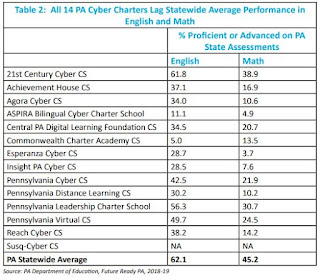In January, the PA Charter Performance Center of Children First released a new report entitled "The PA Disconnect in Cyber Charter Oversight and Funding." The report packs lots of illuminating details into a slim package, showing not just the facts and figures on Pennsylvania's charter schools, but putting them in the context of what the other cyber schooling states are doing these days.
Regular observers of Pennsylvania's wide-open cyber charter schools will not be surprised by anything here, but it's a clear, calm and balanced picture of the commonwealth's dysfunctional cyber sector. It's important to look at because, as the report notes, Pennsylvania last year led the nation in students enrolled in cyber charters. Throwing that in on top of our already-messed-up school funding system, and you get all sorts of issues. Especially since Pennsylvania's cyber charter laws were drafted in 2002 and have never been revisited or revised.
Here are some highlights from the report.
Charter fans have been talking about the great charter growth during the pandemic. In Pennsylvania, of the great jump to charters, 99.7% of that was students jumping to cyber charters. That growth far outpaced growth in any other state.
Most states fund cyber schools at the state level, unlike Pennsylvania, where the cybers are funded at the local level. That means that local school districts absorb the cost directly, giving them a choice between either raising property taxes or cutting programs.
Cyber tuition is based on the local sending district's per pupil costs. In PA, the state puts a small (36%-ish) amount toward school funding, meaning that local districts pick up the rest of the tab locally, to whatever extent they are able. PA's wildly unequal spending means that this is a highly variable figure--per student tuition can range from $9K to $23K for regular students and $18K to $57K for special education students. This means that taxpayers in different districts pay vastly different tuition fees for local students who go cyber; it also means that districts who provide more of their school funding locally will take a bigger local tax hit from cybers. Also, as cyber payments are figured into district funding formulas in subsequent years, the cyber tuition costs automatically go up.
PA used to have a formula for reimbursing districts for a portion of cyber costs. That rule was phased out in 2012 (part of Gov. Tom Corbett's slashing of education funding, which helped earn him his nickname "Old One Term"). Cybers get the same payment as bricks and mortar charter schools, even though they are way less expensive to operate.
Cybers in PA took in about $980 million last year. The report points out that this is more than three times the amount by which Harrisburg increased basic ed funding this year.
There are fully virtual charters operating in 27 states (with West Virginia coming on board shortly). Not one of them does cyber funding as Pennsylvania does.
Twenty-one states fund cybers directly. Three other fund via school districts; all three (Illinois, Oregon and Wisconsin) require cybers to be authorized by local districts, unlike PA, which authorizes charters on the state level. In Wisconsin, cybers have to negotiate payment in their contract with the local district.
Many other cyber-states pay cybers less than they pay brick and mortar charters. Some have other creative arrangements. A couple fund cybers based on performance. One performance based method is to pay cybers based on course completion. Texas requires full-time students to complete four full years (eight semester courses) to get the cyber paid. New Hampshire uses a mastery approach; their single state chartered virtual school was created in 2007, and it pays based on the number of mastery milestones that are hit by students.
A performance-based system would be bad news for PA cyber schools; none of the fourteen schools have ever hit the state proficiency requirements, and some are spectacularly bad. Looking just at 2018-2019, we find that none of the schools beat the state average of 62.1% proficient for English or 45.2% for Math. A couple were almost in the neighborhood, but some--well. Agora Cyber was 34% English, 10.6% Math. Insight PA Cyber was 28.5% English, 7.6% Math. And Commonwealth Charter Academy, the 800 pound gorilla of PA cybers, the business that spent $19 million for advertising over just two years-- their scores show 5% English, and 13.5% Math.

The report notes that state level cyber charters are created by state agencies are created by state legislation or a state-level agency, and therefor accountable to them. Pennsylvania's charter are okayed by the state, then created by businesses and accountable to the business owners. But accountability remains a huge problem for Pennsylvania taxpayers when it comes to charters.
As the report notes, PA is not the only state to face accountability issues. But other states have adapted. In Ohio, the ECOT scandal, in which the major cyber school in the state was found to have lied about enrollment to the tune of tens of millions of dollars, the legislature has tightened up rules. Indiana also had a major scandal (which they found because they require annual audits), and the legislature passed some reforms to tighten the rules. California's huge A3 scandal has led to a moratorium on new cybers, now in place until 2025.
However, in PA, the ScrantonTimes Tribune last year ran a story revealing that six of the 14 cybers have never been reviewed by state auditors, and some only audited once, long ago--Commonwealth Charter Academy's most recent audit was conducted in 2012. As yet the legislature has done nothing other than to oppose Governor Wolf's plan including a required annual audit for cyber schools.
The report includes several recommendations, some of which are pretty basic common sense. Don't pay for cyber charter schools if the local district already offers virtual schooling. Create a state-level cyber as a true public good. Audit cyber schools annually. Set a tuition rate in line with actual costs of providing virtual schooling, and make it uniform across the state. Vet newly proposed charters based on quality and need.
In short, treat virtual schooling as a part of an important public education system, and not as an opportunity for some business folks to hoover up taxpayer dollars. Several superintendents ago, my boss, as he was leaving the job, offered me some advice. "Go start a cyber school," he said. "It's going to be as good as printing money." He was not wrong then. It would be nice if Pennsylvania adopted enough rules so that he would be wrong now.




 ) I think it’s because they’ve seen a drastic spike in searches and they are worried that people are educating themselves rather than blindly believing what MSM narrative. Anyone have a better theory?
) I think it’s because they’ve seen a drastic spike in searches and they are worried that people are educating themselves rather than blindly believing what MSM narrative. Anyone have a better theory?